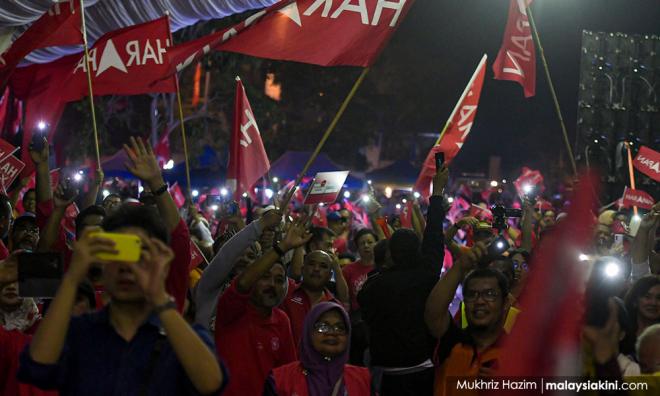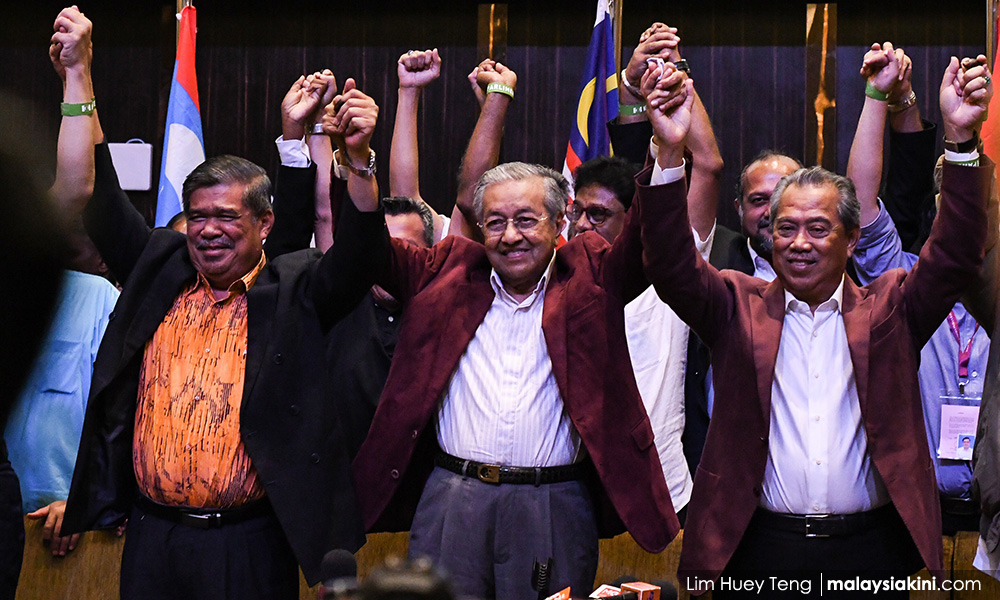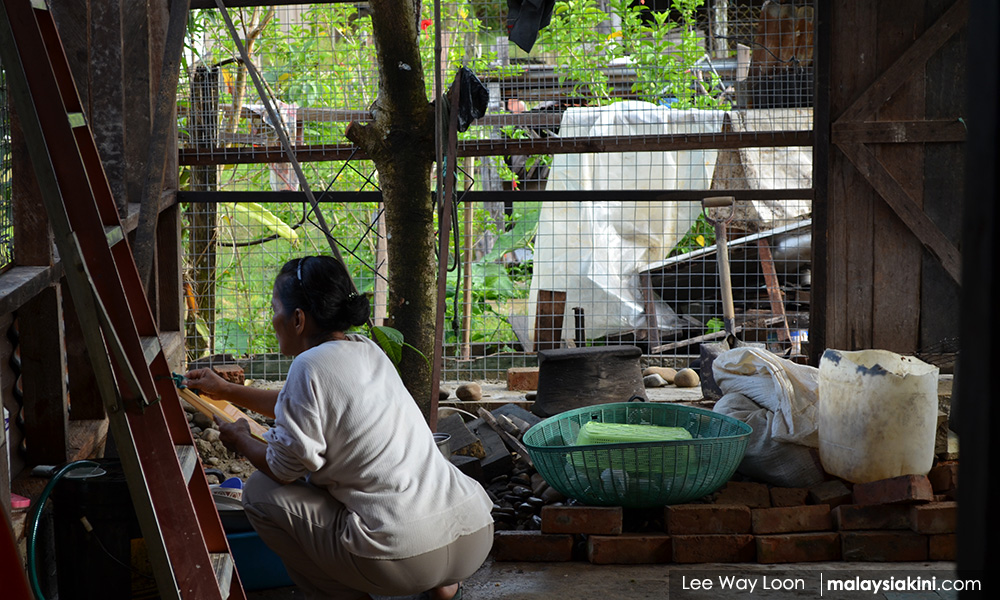
May 9 is the 2nd anniversary of that magical day when the rakyat brought down the proud and mighty BN at the ballot box. Sure, the "Empire Strikes Back", if you’ll permit me a Star Wars analogy, but let’s never forget that we, the people, did manage to do the impossible.
In the run up to the elections, the mood had been electric. Huge crowds had come for Pakatan Harapan ceramahs all over the country, even those held near Umno’s so-called “Felda fortresses”. Ceramah audiences were asked to display their handphone lights, and “seas” of lights glimmered, promising a wave of change.
I managed to join one of these huge rallies in the Keramat area of Kuala Lumpur. The padang (field) at the venue was soggy and muddy, yet heaps of humanity -- of all races -- were huddled there, under an intermittent drizzle, heaving for hope, for “harapan”, of a better country.
Hawkers were doing brisk business too - food, drinks and lots of T-shirts, especially of former premier Dr Mahathir Mohamad, as if he was some Che Guevara hero or something. I bought a generic Pakatan T-shirt, but refused to spend RM20 on a Mahathir one. Yes, he was needed to swing the tide, but I could not forget how his rule had led to the rot dragging down the country now.
Remember the tensions of election day? The huge and eager turnout even before polling stations opened, the long queues, the whispers of conspiracies to prevent certain people from voting and the fear of sudden blackouts when counting ballots.
Recall how the results stopped coming out after a certain time when BN was losing? And the rumours flying around. Would the election authorities be fair? Would an emergency be declared?
When victory was finally declared in the wee hours of May 10, I could hardly believe it… against all odds, the "Death Star" had been destroyed.

We all know how the story has turned out since. Leaders in Harapan may have been on the same bed, but they had different dreams, as the Chinese proverb goes. The "Dark Side" was found not just on the BN side, but among the so-called “good guys” too. In fact, even after the departure of the Muhyiddin Yassin-Azmin Ali gang, let’s not fool ourselves that all is well.
As long as power and greed can easily corrupt people (politicians and ourselves too), as long as we lack a strong system to check these baser instincts, the journey towards reform is not finished.
Now there’s talk that the game is still on, that Perikatan National are fighting among themselves for the spoils of their coup, that trouble is brewing between Bersatu and Umno in Johor, that a vote of confidence in Parliament on May 18 could lead to a dramatic plot twist.
My take is, even if Harapan somehow manages to regain power, that is merely the first step of a long journey of repairing a damaged Malaysia.
For starters, how will they deal with the weaponisation of the 3R’s - race, religion and royalty? Will any new Harapan communications minister and home minister sit by, seemingly powerless, as before, when political poisons are constantly dripped from the other side?
Or will swift action be taken the moment somebody insults another race online (especially using fake news)? But can this be done when Harapan won only 25 to 30 percent of the Malay vote in the last elections?
I am especially concerned with the reform of political financing, because if rich tycoons can influence leaders with “party donations”, then we will end up merely shifting one form of elite rule for another, just as Americans alternate between the Democrats and Republicans who both favour corporate interests over that of common folks.
As pointed out by Dr Jeyakumar Devaraj, the chairperson of PSM, certain Harapan decisions seemed to be influenced by the mindset of pure market efficiency and this cost it valuable support, especially from the Malays.
These included the stopping of subsidy payments of RM300 per month to more than 70,000 traditional fishermen and the price support system for 200,000 rubber smallholders.
He noted that Harapan should have kept the allocations for the rural and urban poor, but with full transparency. For example, all funds for, say repairing kampung homes or urban low cost flats, should be published on the internet so that people can monitor how, where and when the money is spent, and to prevent “pihak-pihak tertentu” (certain quarters) from abusing it.

If all this is done, will it make the poor, the majority of whom are Malays, realise how much those who claim to be their racial “saviours” have siphoned off into their own pockets? Will it make them believe less in the propaganda peddled by certain politicians day in, day out?
The proof of the pudding is in the eating, and probably the most important area for Harapan will be to raise income while lowering living costs. This will be a challenge given that our economy has been hit by the double whammy of the Covid-19 pandemic and low oil prices.
But again, as Jeyakumar points out, helping the poor will not cost that much. For example, a Universal Pension Scheme of RM300 per month for all the poor above 70 will only cost about RM3 billion per year. This money will help not only people, but also stimulate the economy, as the elderly will spend it on food and other necessities.
And remember the many Harapan manifesto promises? Will they finally be fulfilled?
- Will the police force be cleaned up with an IPCMC?
- Will one million affordable homes be built?
- Will GLCs be run professionally, free from political influence?
- Will draconian laws like the Sedition Act finally be repealed?
Now that former PKR members Azmin and Zuraida Kamaruddin along with Bersatu's Rina Harun, Muhyiddin and Redzuan Yusof have joined PN, is there any more excuse not to execute the manifesto pledges? Oh wait, there’s Mahathir. At his grand old age, has he woken up to the need for genuine reform?
But let’s stop depending so much on politicians. Ultimately, change occurs when enough people want it. Politicians merely reflect popular pressure and it's up to us to push for what we need and want. In history, that's the only way real change has ever happened.
Politicians are not that powerful. If you need proof, just look at how the back door government did several u-turns on their movement control order policies after some online outcries. They also fear the rakyat's anger.
See what the French have achieved in reversing unpopular policies, with mass demonstrations while wearing yellow vests. And what we have achieved with our own yellow T-shirt protests.
So please don’t surrender, don’t give up in despair. Keep speaking up for a better Malaysia, even if it's just on Facebook or WhatsApp. If you can organise people to do things, even small things at the local level, all the better. At a bare minimum, please vote. We will get the politicians that we deserve, or at least those that we push for.
Yes, May 9 is the second anniversary of the people's power. Let’s not forget that.
ANDREW SIA is a journalist who prefers teh tarik kau over tepid English tea. - Mkini



No comments:
Post a Comment
Note: Only a member of this blog may post a comment.